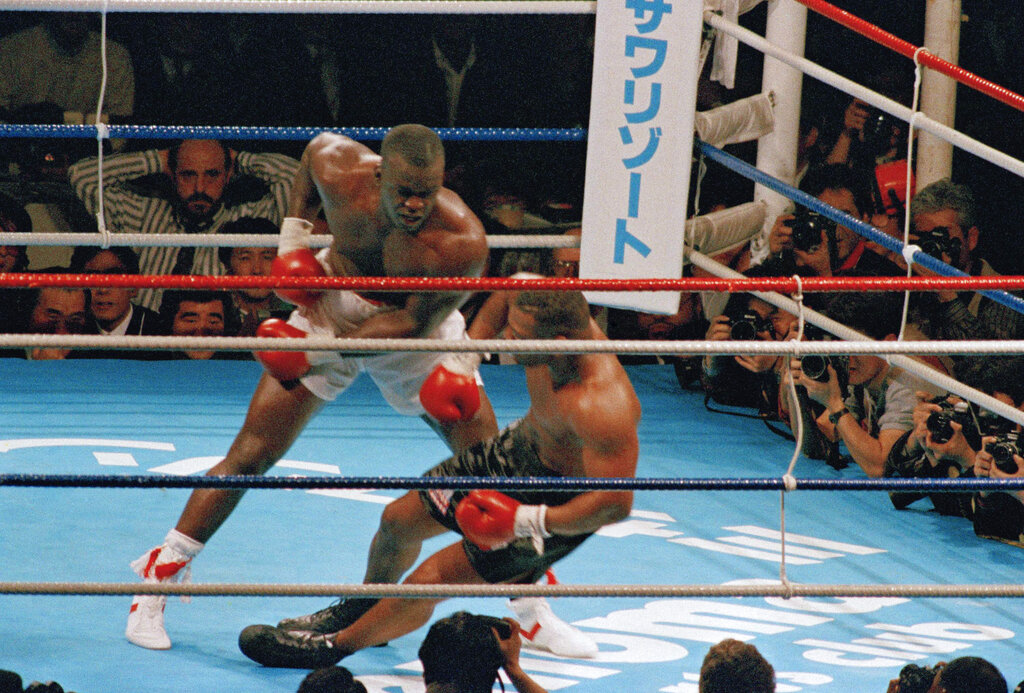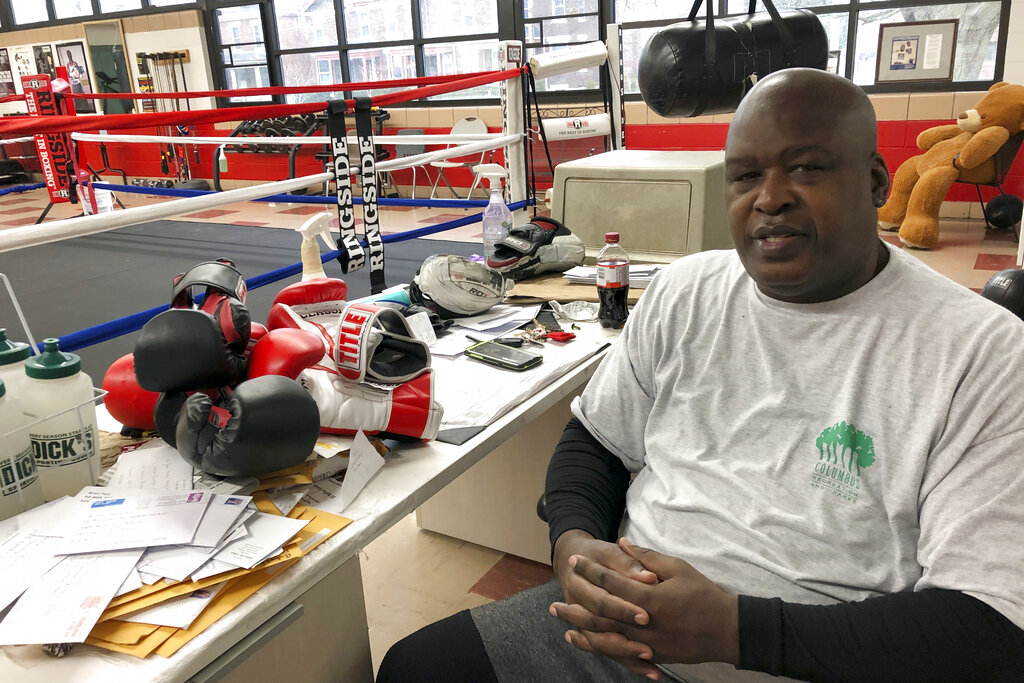30 years after Mike Tyson fight, Buster Douglas is ‘feeling good’

FILE – In this Feb. 11, 1990, file photo, James Douglas, left, follows with a left, dropping Mike Tyson to the canvas in the 10th round of scheduled 12-round heavyweight champion bout at the Tokyo Dome in Tokyo. In one of the more spectacular upsets in sports history, Douglas defeated Tyson, the reigning world heavyweight champion. (AP Photo/Tsugufumi Matsumoto, File)
COLUMBUS, Ohio — Thirty years after his hard-fought victory against boxing titan Mike Tyson, Buster Douglas is feeling healthy and basking in the glory he says he was denied at the time.
“Right now, everything is looking up,” Douglas said in a recent Associated Press interview, noting he struggles with diabetes. “Feeling good and the numbers are good. It’s a good thing.”
Article continues after this advertisementThe 59-year-old fighter will be celebrated at an anniversary gala Friday in his hometown of Columbus, Ohio, where he’ll raise money for programs that help others who face seemingly insurmountable challenges.
His stable of students throughout Columbus’ parks and recreation system look up to the man they call simply “coach” as a teacher, friend and hero.
“I mean, I really look up to Mike Tyson, but I don’t look up to him as much as Coach,” said 11-year-old Colton Matson, who has worked with Douglas since he was 6.
Article continues after this advertisement“Really, Mike Tyson was the second-most greatest boxer in the world still to this day. It’s crazy that Coach, like, just beat him,” he said. “It might have just been luck, but I can tell you that Coach worked hard for it even if it was luck.”

In this Jan. 31, 2020 photo, James “Buster” Douglas, the former world heavyweight champion, sits at the Thompson Community Center in Columbus, Ohio, where he teaches youth boxing. In one of the more spectacular upsets in sports history, Douglas defeated Mike Tyson, the reigning world heavyweight champion on Feb. 11, 1990, in Tokyo. (AP Photo/Julie Carr Smyth)
Tyson was the reigning undisputed heavyweight champion of the world, and a frightening opponent to boot, when he entered the ring against James “Buster” Douglas on Feb. 11, 1990, in Tokyo. Only one Las Vegas bookie — whether brave or stupid — would set odds on the fight: 42 to 1.
Douglas won, stunning the sports world. But what followed was anything but a celebration.
Tyson and fight promoter Don King challenged Douglas’ victory, claiming Douglas had gone down first in the fight but been given more time than allowed to get up. Douglas’ victory was ultimately upheld, but not before months of drama and expensive litigation.
“Don came at me with a vengeance and I was subpoenaed everywhere I went to,” Douglas said. “It made it very uncomfortable and kind of took the ‘f’ out of fun.”
A message was left at a phone number for King.
Tyson didn’t respond to an interview request. He told late-night talk show host Jimmy Kimmel in 2015 that it was “Buster’s anniversary” to celebrate, not his. Tyson said the loss was a positive for him in the end, allowing him to learn how to “overcome adversity.” The two have barely crossed paths since the fight.
The dispute over the fight’s outcome — combined with lingering grief over his mother’s death shortly before the fight — sent Douglas into a slump, he said.
“Believe it or not, I was where I really didn’t care about anything,” he recalled. “Something I always looked forward to becoming one day and then you get it and it turns into a nightmare really quick.”
Douglas said he was almost relieved when Evander Holyfield knocked him out in the third round of their match-up a little over eight months later, taking the title.
“It was a relief and then it was upsetting, too, because of how it all came to an end,” Douglas said.
A short reign, with a long legacy. The fight is still remembered as one of the most spectacular upsets in sports history. Douglas’ story gained new attention with the 2018 release of an ESPN documentary, titled “42 to 1” after the odds against Douglas.
Douglas has given his charity effort the same name and formed an ongoing strategic partnership aimed at delivering several programs focused on workforce development, diversity and soft skills training to at-risk youth.
He said working with kids is one of his favorite things to do.
Inside a training ring at Columbus’ Thompson Community Center, Douglas towers over most of his students, chanting, “Left, right, left, right, left, left” as they punch away at the pads on he wears on his hands in place of gloves.
He said he gave up on his life and health for a period after the fight. In 1996, he woke up in a hospital on death’s door. Again, life presented him a mountain to overcome.
“A light bulb came on. It was either get back into life or cash it on in,” he said. “I decided to get back into life.”
He staged a six-fight comeback before retiring from boxing in 1999, then launched into his work with the city of Columbus.
Students say he’s kind, tough, generous and “very genuine.” It’s all enhanced by what he accomplished in 1990.
“It really inspires me that he beat the best boxer in the world back then,” Matson said, “and I just think that’s awesome.”